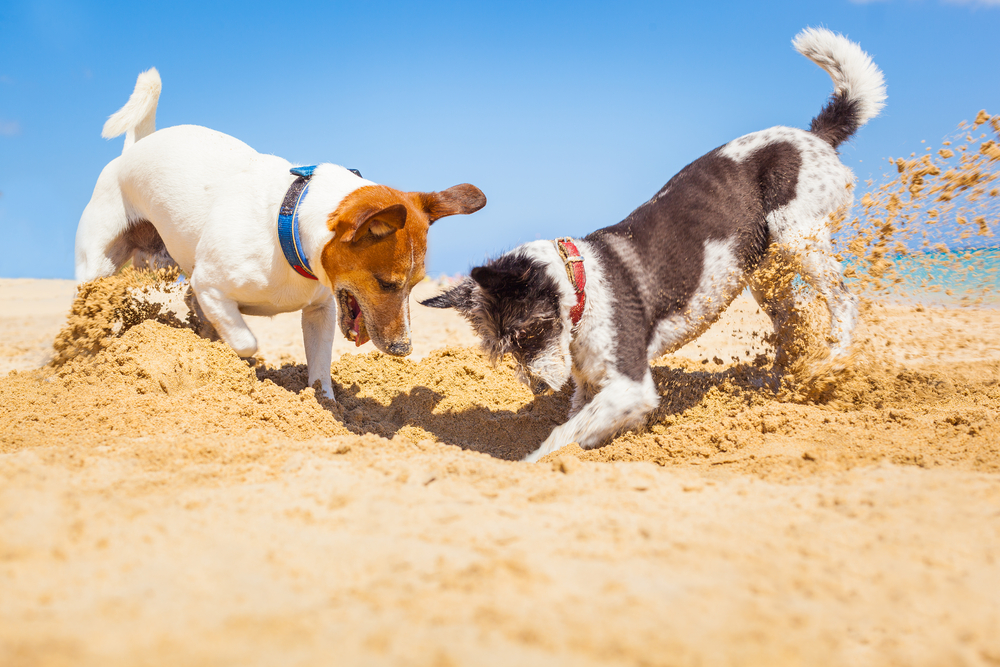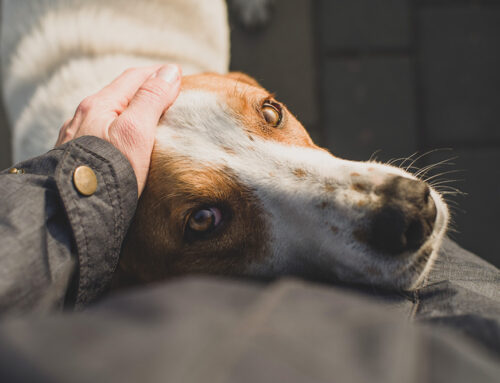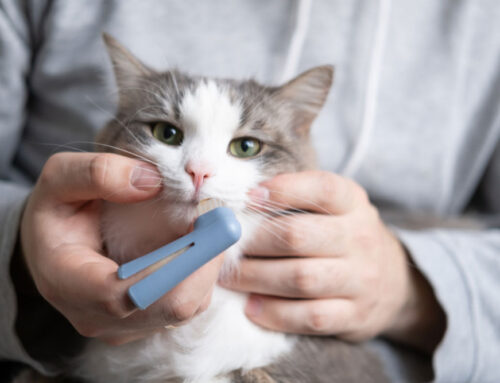As Floridians, we live in a relatively warm climate, and are lucky to have so many beaches to enjoy. During the summer months, it seems only right to take your pet to the beach. How do you ensure a summer trip to the beach together is safe? Let’s find out.
UV-rays, meet skin—of people and pets
Summer UV rays are more intense, and most adults are mindful that sunscreen is a must-pack when they head out for a summer adventure. If you don’t care about the pain of your skin burned to a crisp, or other short-term effects of sunburn, certainly you should care about the prospect of skin cancer. And, you may not consider that your dog also needs sunscreen, because most of their body is covered in fur, but most dogs have body areas where their skin is exposed, including the top of their nose, around the muzzle, the ears, armpits, groin, and belly. If you can see any skin through your dog’s fur, the sun’s rays can certainly reach there, and cause painful sunburn, so protect those areas with pet-safe sunscreen. Pets can also develop skin cancer.
Heat wave, meet a pet’s fur coat
Most dogs and cats have fur, which people are usually keenly aware of because their pet sheds, but unfortunately, they quickly forget about the effect of a permanent fur coat during the summer months. Because of their fur coat, and because they cannot sweat like humans to control their body temperature, pets brought out to walk, run, or play in the summer heat creates a perfect prologue to heatstroke. Heatstroke occurs when your pet’s body temperature rises so high that vital body functions and processes are disrupted. Heatstroke can be fatal, if not treated immediately. Always monitor your dog outside, and take them inside as soon as they show any heat illness signs, which include:
- Excessive panting
- Excessive drooling
- Lack of coordination, or stumbling
- Vomiting
- Diarrhea
To prevent heat-related illness in your pet, keep them out of the sun, or keep them indoors during the hottest part of the day. Do not force them to exercise in the middle of the day, and ensure they always have access to shade, and fresh, cool water. Because dogs can only pant to cool their body temperature, never muzzle your pet while outdoors on a warm or hot day.
During the summer months, dogs can suffer from heat exhaustion, or more serious heatstroke, when locked inside a hot car, for only a few minutes. The American Veterinary Medical Association reports that hundreds of dogs perish this way every year. The temperature in a parked car on a 70-degree day can rise 20 degrees in only 10 minutes—you’ve no doubt sat briefly in a parked car, without air-conditioning, on a hot day, and know how awful that can be. People who think they “will only be gone a few minutes,” or that they “cracked the windows so the dog should be fine,” are taking a huge risk with their dog. Don’t take the chance—go back home and leave your pet there, and run out to the store later.
Pavement, meet pets’ paws
The sun not only sends UV-rays and increases the ambient temperature, but also scorches the ground. The hot pavement of driveways, roads, and parking lots is one of the biggest safety concerns for pets outdoors in summer, because they become way too hot for your dog’s or cat’s paws. Remember, dogs and cats do not wear shoes, so hot pavement can inflict serious and painful burns on their paws. Always check the pavement with your hand—if it’s too hot for your hand, it’s too hot for your pet, and you must find a dirt or grass track for walking.
Sand, meet a pet’s stomach

Owners of dogs who enjoy walking on the beach, and playing or surfing in the waves, must be mindful of the amount of sand their pet swallows. A dog who picks up a toy from the sand, or loves to dig, may swallow sand, which may sound harmless, but can cause ulcerations on the intestinal lining, which can lead to vomiting and bloody diarrhea. Many dogs who develop these signs after ingesting sand need veterinary treatment, so keep an eye on your dog at the beach, and after you get home.
At Palm City Animal Medical Center, we want to ensure your whole family has a fun, safe time this summer. If you have any questions about preparing for summer adventures with your dog or cat, give us a call, or make an appointment to speak with our team.








Leave A Comment